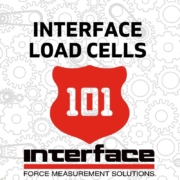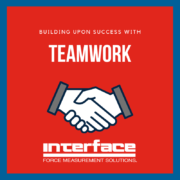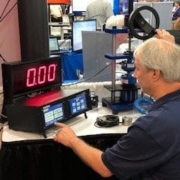Interface Solutions for Robotics and Industrial Automation
 As the manufacturing world continues to push towards the 4.0 Industrial Revolution, critical technology is necessary to ensure facilities are running as efficiently as possible. With advancements toward fully or semi-autonomous factories and robotics, manufacturers need to have total trust in their hardware and software to perform with precision in the assigned tasks. This requires collecting accurate and real-time data to constantly monitor every aspect of the facility’s technology and production.
As the manufacturing world continues to push towards the 4.0 Industrial Revolution, critical technology is necessary to ensure facilities are running as efficiently as possible. With advancements toward fully or semi-autonomous factories and robotics, manufacturers need to have total trust in their hardware and software to perform with precision in the assigned tasks. This requires collecting accurate and real-time data to constantly monitor every aspect of the facility’s technology and production.
In the development of robotics used in industrial automation, our Interface Multi-Axis Sensors are often used to test the multi-directional movement and force of robotics arms. Whether it’s a fully automated or semi-automated robotic system, manufacturers need to be able to ensure the complex movements and actions of the robotics arm are optimized to take on very precise jobs. These types of robotics are often used for projects that are too precise for the human hand.
Industrial automation and robotics are creating a more efficient manufacturing process, which will help to churn products out more quickly and lower costs. However, to optimize these processes, it’s critical that we trust the hardware to operate autonomously and that we have systems in-place to identify malfunctions quickly.
Interface plays a critical role in robotics and industrial automation by providing our customers with highly accurate load cells and torque transducers to measure and collect data on the force and torque that these machines are exerting. Interface force measurement solutions and products are involved in the testing of the machines before they hit the production line, and in some cases, our products are also installed directly on the machine to allow users to monitor the force in real-time.
One industry that has a high demand for our products is the consumer packaging industry. Many of the processes involved in the production line of a consumer packaging plant have utilized automation for a long time.
 For instance, beverage companies that sell bottles of water or soda utilize machines that cap the product all day long. Hundreds of thousands of bottles go through the capping process on the production line daily. If there are any issues with the torque applied in the capping process, the beverage company could see heavy losses because the bottle could be damaged from over torquing the cap, or the beverage could leak during the shipping process if the caps are under torqued. To avoid these loses, the machines are optimized using a torque transducer.
For instance, beverage companies that sell bottles of water or soda utilize machines that cap the product all day long. Hundreds of thousands of bottles go through the capping process on the production line daily. If there are any issues with the torque applied in the capping process, the beverage company could see heavy losses because the bottle could be damaged from over torquing the cap, or the beverage could leak during the shipping process if the caps are under torqued. To avoid these loses, the machines are optimized using a torque transducer.
Torque transducers provide data during the testing process to help the machine manufacturer get the force exactly right for the capping process. The torque transducer can also stay installed on the machine so that the beverage company can continuously monitor the torque of the machine and stop production before damages occur if there is an issue.
Interface offers nearly 50 types of reaction (static) torque transducers and rotary (dynamic) torque transducers. All of our torque transducers are precision-machined and use our proprietary torque sensors for the most accurate data possible.
Another common automation use for force and torque measurement products is in the automotive industry. Automation in this industry has been used for some time increase production of cars.
Two examples of how Interface load cells and torque transducers play a role in the automobile production line is with seat durability testing and bolt fastening.
For seat testing, we had a customer use an Interface Multi-Axis Model 6A68C 6-Axis Load Cell to identify previously unknown bending forcing that could negatively influence their testing process. This allowed the customer to redesign their testing fixture to eliminate the bending moment and more accurately perform the durability testing.
For bolt fastening, we installed an Interface Model LWCF Clamping Force Load Washers along with Interface Instrumentation to monitor the force being applied during bolt tightening. This helped the customer avoid over tightening bolts, which could damage the product in the process.
For a more in-depth overview of both applications, please check out our application notes:
Force measurement products are a critical technology in the testing and monitoring of automation equipment. To learn more about the various products and instrumentation Interface supplies to facilitate industrial automation and support advancements in robotics, contact our applications experts here. We also have a number of application notes focused on industrial automation here.
Contributor: Ken Bishop, Sr Sales Director, Custom Solutions and Services









